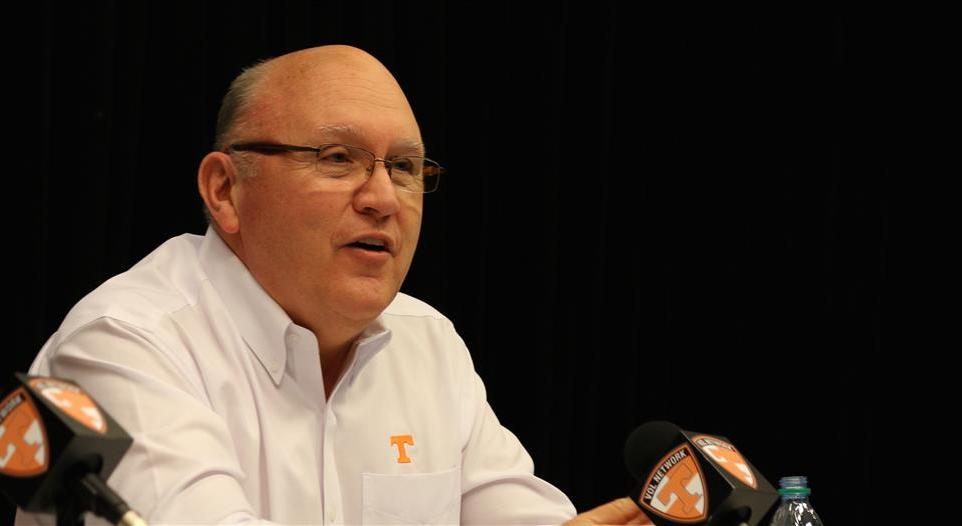UT's Mike DeBord comes to Knoxville to 'recharge' offense
SDS will look at new assistant coaches around the SEC, highlighting their accomplishments, achievements, history and tough tasks ahead of them. Today we’ll examine Tennessee offensive coordinator Mike DeBord.
Mike DeBord, Tennessee offensive coordinator
History:
- 2015: Tennessee offensive coordinator
- 2010-12: Chicago Bears tight ends coach
- 2008-09: Seattle Seahawks offensive line coach, tight ends coach
- 2004-2007: Michigan special teams coach/recruiting coordinator, offensive coordinator/tight ends coach
- 2000-2003: Central Michigan head coach
- 1992-1999: Michgian offensive line coach, offensive coordinator
- 1992: Northwestern offensive line coach
- 1990-91: Colorado State offensive line coach
- 1988-89: Ball State offensive line coach
- 1987-88: Eastern Illinois offensive line coach
- 1984-86: Fort Hays State offensive line coach, offensive coordinator/quarterbacks/offensive line coach
- 1982-83: Franklin (Ind.) offensive line coach
What goes around comes back around. Back in 2002, Mike DeBord promoted a 34-year-old Butch Jones to offensive coordinator at Central Michigan, putting Jones on the fast track to the head coaching ranks. Now, in 2015, Jones is bringing his former boss back to the gridiron as his OC at Tennessee.
DeBord had been away from the coaching aspect of the game for several years before Jones came calling earlier this month. It was likely a call Jones wasn’t counting on having to make, as former OC Mike Bajakian decided in early February — far later than most coordinators leave after the season — that he’d be leaving to pursue an opportunity at the professional level.
Since 2013, DeBord had worked at Michigan as an administrator for the school’s Olympic sports: field hockey, track and field, cross country and others. It marked a return to the place where DeBord had his highest level of success. DeBord had twice been offensive coordinator for the Wolverines, from 1997-99 and 2006-07. In his first stint with the school, he oversaw the offense for the BCS champion 1997 team, finding a variety of ways to use Heisman-winning superstar Charles Woodson. The following year, Tom Brady led the Wolverines to a second consecutive Big Ten title.
After the 1999 season, DeBord left the Wolverines to take over the program at Central Michigan. He was just 12-34 in his four years at the helm, resigning after the 2003 season. It was there that he first worked with Jones, who was the running backs coach when DeBord took over.
DeBord returned to Michigan as special teams and recruiting coordinator after his time at Central Michigan, resuming the role of offensive coordinator after two years back on Lloyd Carr’s staff. He left when Carr retired in 2007, making coaching stops in the NFL with the Seattle Seahawks and Chicago Bears before taking the administrative role at Michigan.
In his interviews since landing the job at Tennessee, DeBord has expressed excitement and enthusiasm for the job, using terms like “recharged” and saying there would be “no rust,” as he’s been observing Michigan practices since returning to the school Jones has talked about simply needing to “enhance” the offense, as opposed to overhauling it, and that’s what DeBord will be counted on to do.
There won’t be many changes to Jones’ up-tempo style of offense in Knoxville, but it’ll be on DeBord to help bring along rising sophomore quarterback Joshua Dobbs, one of the brightest young stars in the SEC. DeBord’s extensive experience working with offensive lines at both the college and professional levels is a major plus for a team that struggled to block in 2014.
Jones will put a good amount of trust into his old boss, something that should carry over across the staff. There are several other coaches who worked with Jones and DeBord at Central Michigan, and that familiarity should help Tennessee continue on with its ascension in the East.

